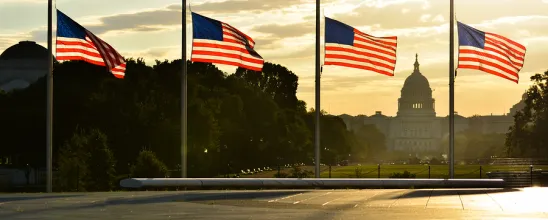Elections in the United States are scheduled for Tuesday, November 3, 2020. Not only will the office of president of the United States be contested, but all 435 seats in the U.S. House of Representatives and 35 of the 100 seats in the U.S. Senate are up for grabs. At the state level, elections will be held for the governorships of 11 U.S. states and 2 U.S. territories.
In addition, numerous ballot measures will be voted on, including medical marijuana legalization in Mississippi and South Dakota; recreational marijuana legalization in Arizona and New Jersey; constitutional amendments in Alabama, Colorado, and Florida regarding voting rights; ranked- choice voting in Massachusetts; cash bail system reform in California; Electoral College membership in Colorado; sports betting in Maryland; a new state flag in Mississippi; expansion of Medicaid under the Patient Protection and Affordable Care Act in Missouri and Oklahoma; and others.
Interest in these ballot measures, typically higher voter turnout in presidential election years as compared to midterm elections, and social and political unrest will likely yield higher-than-average voter turnout. Further, the significance of impending redistricting by state legislatures following the 2020 United States Census may drive greater voter turnout.
Accordingly, employers may receive more requests for voting leave than in prior years. The following overview of state voting leave laws will arm employers with a basic knowledge of voting leave rights and prepare them for potential leave requests.
States Without Voting Leave Requirements
Many states do not have voting leave requirements. These include Connecticut, Delaware, Florida, Hawaii, Idaho, Indiana, Louisiana, Maine, Michigan, Mississippi, Montana, New Hampshire, New Jersey, North Carolina, North Dakota, Oregon, Pennsylvania, Rhode Island, South Carolina, Vermont, Virginia, Washington, and the District of Columbia(but see below).
Although some states may not have specific voting leave laws, they may prohibit attempted influence or threats of discharge related to voting activity. For instance, although Connecticut, Florida, Idaho, Louisiana, Michigan, and Mississippi do not have specific voting leave laws, they more generally prohibit attempts to influence or prohibit employees’ voting, such as by threatening discharge or retaliation. Finally, North Dakota “encourages” employers to provide employees with time off to vote, but does not require them to do so.
States With Unpaid Voting Leave Laws
A number of states require employers to provide some amount of unpaid voting leave to their employees. Arkansas requires employers to schedule employees so they have an opportunity to vote. Ohio requires employers to provide a “reasonable” period of unpaid leave. In Alabama, employees are entitled to one hour of voting leave if polls are not open two hours before, or one hour after, the employees’ working hours. To take leave, employees must simply give reasonable notice. Employers may specify the hours for leave. In Georgia, employees must give reasonable notice and employers must provide “necessary” time off to vote, up to two hours, unless the polls are open at least two hours before or after the employees’ working hours. Again, employers may specify the hours for leave. However, Georgia employers are not required to provide this time off for employees who have at least two hours before or after work during which the polls are open. In Massachusetts, the voting leave requirement applies only to employees in manufacturing, mechanical, and mercantile operations, and voting leave is available only in the first two hours that polls are open.
Some states require that employers provide more than two hours of leave for employees to vote. For example, Wisconsin requires employers to provide employees with three hours of unpaid leave, subject to advance notice. Kentucky provides the most generous unpaid voting leave period, requiring employers to provide employees with four hours of unpaid leave, subject to advance notice and the employers’ entitlement to specify the hours of leave.
States With Paid Voting Leave Laws
Employers in a number of states are also required to provide employees with paid leave for the purpose of voting. In Alaska, employees who do not have at least two consecutive nonworking hours to vote may take off as much working time as will enable them to vote. In Minnesota, employees must be given paid time off for “the time necessary” to get to their polling place, vote, and return to work. In Nevada, employees must request voting leave before election day, and the amount of time that is considered “sufficient” is determined by the distance of the polling place from an employee’s worksite (1 hour for up to 2 miles; 2 hours for greater than 2 and up to 10 miles; and 3 hours for more than 10 miles). In Texas, employees may take paid time off to vote, unless the polls are open during two consecutive nonworking hours. Wyoming requires that one hour of paid leave be provided, not to include meal breaks, unless the polls are open for three or more consecutive nonworking hours.
Many states require up to two paid hours of leave for voting purposes, including California, Colorado, Illinois, Kansas, Maryland, Nebraska, New Mexico, New York, Oklahoma, South Dakota, and Utah. In addition to providing voting leave, California requires employers to post a notice of employees’ voting rights 10 days prior to an election. California also requires two working days’ notice from employees before taking leave. Colorado’s statute requires two hours of paid leave if employees provide advance notice and do not have three or more nonworking hours to vote when polls are open. Illinois and Nebraska also require that employees request leave in advance of elections. Paid leave is unavailable in New Mexico for employees whose workday begins two hours after polls open or ends three hours before polls close. Similarly, New York’s paid voting leave is not available to employees who have four consecutive nonworking hours while polls are open to vote. New York, like California, requires that employers post a notice of employees’ voting leave rights prior to election day, and also requires that employees request leave at least 2 days, but not more than 10 days, in advance.
Oklahoma’s and Utah’s voting leave entitlements are subject to advance request by employees and are unavailable to employees if polls are open three or more hours before or after their working hours.
In addition, Washington, D.C.’s Leave to Vote Amendment Act of 2020, which became effective on October 1, 2020, requires District of Columbia employers to provide at least two hours of paid leave for employees to vote in person, subject to “reasonable” advance notice, including for early voting, if the employees are scheduled to work during the time for which the leave is requested. Employees are eligible whether they vote in D.C. or in another jurisdiction as long as they are scheduled to work during the time for which the leave is requested. In addition, employers must post a “Time Off to Vote” notice in a conspicuous location where employees report to work and on the employer’s website, if applicable.
A number of states require that employers provide up to three hours of paid voting leave, including Arizona, Iowa, Missouri, Tennessee, and West Virginia. These states may require that employees provide employers with advance notice of their need for voting leave, often in writing, as is the case with Iowa and West Virginia.




 />i
/>i

